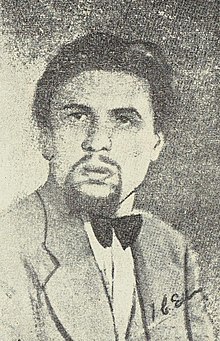Ismail bin Ahmed bin Ismail bin Ibrahim bin Adham (Arabic: إسماعيل أحمد أدهم IPA: [esmæˈʕiːl ˈæħmæd ˈʔædhæm] Ismā'īl Aḥmad Adham; 13 January 1911-23 July 1940) better known as Ismail Adham was an Egyptian writer who was born and educated in Alexandria, then obtained a doctorate in science from Moscow University in 1931, and was appointed as a teacher of mathematics at Saint Petersburg University. Then he moved to Turkey and was a teacher of mathematics at the Ataturk Institute in Ankara, and returned to Egypt in 1936. He is one of the former Muslim writers who declared their atheism, wrote about it, and defended their ideas. He has a booklet entitled “Why am I an atheist?” He declared in this booklet that he is happy and content with this atheism, just as a believer in God feels happy and at peace.[1]
Views about him[edit]
Several historians and researchers, wrote about him, including Al-Zirakli in "Al-Alam", Al-Kayyali in “The Departed,” and Ahmed Al-Hawari in his collection of the aforementioned works. These translations were collected by the researcher Suleiman Al-Kharashi in his book “The Suicide of Ismail Adham,” with some references about the aforementioned in newspapers and magazines, as well as responses and discussions. About his book “Why am I an atheist?”
Death[edit]
Adham apparently suffered from depression, and fueled his melancholy by reading Schopenhauer and Kierkegaard.
On the evening of July 23, 1940 AD, the body of Ismail Adham was found floating on the waters of the Mediterranean coast. In his coat, the police found a letter from him to the chief prosecutor informing him that he had committed suicide due to his asceticism in life and his hatred for it, and that he recommended that his body not be buried in a Muslim cemetery and requested that it be burned.[2][3]
References[edit]
- ^ الزركلي, خير الدين. "موسوعة الأعلام". موسوعة شبكة المعرفة الريفية. Retrieved 9 April 2024.
{{cite web}}: Check|archive-url=value (help)CS1 maint: url-status (link) - ^ Alkhair, Hany (1993). (مشاهير و ظرفاء القرن العشرين) [(Famous and satirist people in the 20th century)] (in Arabic) (1st ed.). Damascus: دار الكتاب العربي (The Arabic bookhouse). pp. 63–68.
- ^ الخراشي, سليمان بن صالح (4 January 2003). "انتحار ملحد" [The suicide of an atheist]. Islamway. Archived from the original on 31 May 2018. Retrieved 4 January 2003.
External links[edit]
- [1] "Blasted Backlash," by Gamal Nkrumah. Al-Ahram Weekly, 3–9 April 2008, Issue No. 891
- [2] Archived 28 September 2011 at the Wayback Machine "Islamic viewpoints: New secularism in the Arab world," by Ghassan F. Abdullah. Center for Inquiry.
- [3]ismail adham's arabic wikipedia page
- Arabs without god; chapter 2 for more information about him
- An overview of the reactions to his manifesto
- A journal article about the reactions to his manifesto
- His works at hindawi.org (in Arabic)
- His manifesto at archive.org (in Arabic)
- His manifesto at scribd.com (in Arabic)
- A more clear edition of his manifesto
- A translation of his manifesto in English (sceptics of islam pp 79-91)
